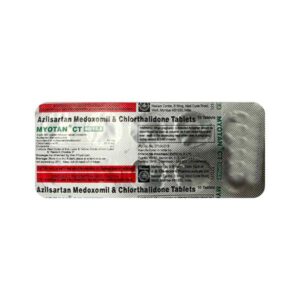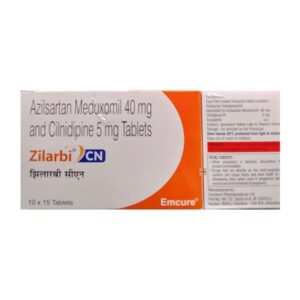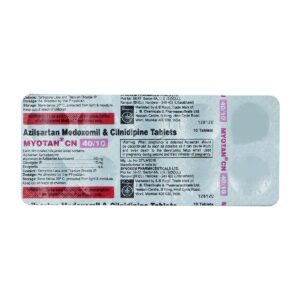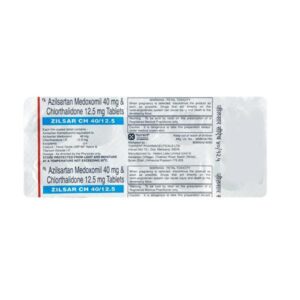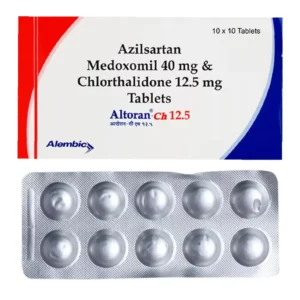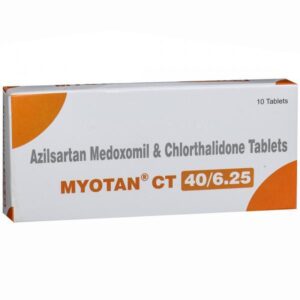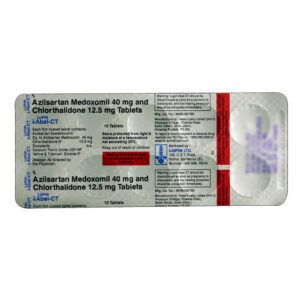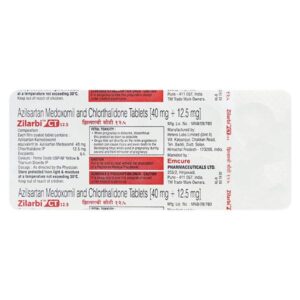CHLORTHALIDONE + AZILSARTAN
Chlorthalidone: Chlorthalidone is a medication classified as a thiazide diuretic. It is primarily used to treat hypertension (high blood pressure) and edema (fluid retention) in conditions such as congestive heart failure and kidney disorders.
The drug works by increasing the excretion of sodium and water by the kidneys, which ultimately reduces the fluid volume in the blood vessels and lowers blood pressure. Chlorthalidone achieves this by inhibiting the reabsorption of sodium and chloride ions in the distal convoluted tubules of the kidneys.
The usual dose of Chlorthalidone for hypertension is 12.5 to 25 mg taken orally once a day. In some cases, the dosage may be increased to 50 mg per day if necessary. For edema, the typical starting dose is 25 to 100 mg daily, taken as a single dose or divided into multiple doses.
As with any medication, Chlorthalidone may cause side effects. Common side effects include frequent urination, dizziness, lightheadedness, muscle cramps, nausea, weakness, and low blood pressure. Less common side effects may include electrolyte imbalances (such as low levels of potassium, sodium, and magnesium), increased blood sugar levels, gout, allergic reactions, rash, photosensitivity (increased sensitivity to sunlight), and impotence. It is worth noting that some patients may experience no side effects at all.
Chlorthalidone should be used with caution in individuals with a history of gout, kidney problems, diabetes, or liver disease. It is also important to inform the healthcare provider about all other medications being taken, including over-the-counter drugs, as there may be potential interactions.
In summary, Chlorthalidone is a thiazide diuretic used to treat hypertension and edema. It works by increasing the excretion of sodium and water. The usual dose ranges from 12.5 to 100 mg per day, depending on the condition being treated. While generally well-tolerated, common side effects may include frequent urination and dizziness, while less common side effects can include electrolyte imbalances and allergic reactions.
Azilsartan: Azilsartan is a medication in the class of drugs known as angiotensin II receptor blockers (ARBs). It is commonly prescribed to treat high blood pressure, also known as hypertension. Azilsartan works by blocking the action of angiotensin II, a hormone that causes blood vessels to constrict, leading to an increase in blood pressure.
The recommended starting dose of Azilsartan is usually 40mg once daily. It can be taken with or without food. If blood pressure is not adequately controlled, the dose may be increased to 80mg once daily. Azilsartan is available in tablet form.
Like any medication, Azilsartan may cause certain side effects. Common side effects may include dizziness, headache, back pain, diarrhea, and upper respiratory tract infection. It is important to note that not all individuals will experience side effects, and the severity and frequency of side effects can vary from person to person.
It is crucial to inform your healthcare provider about any pre-existing medical conditions or allergies before starting Azilsartan. Also, it is essential to follow the prescribed dosage and inform your doctor if your blood pressure remains uncontrolled or if you experience any concerning side effects.

